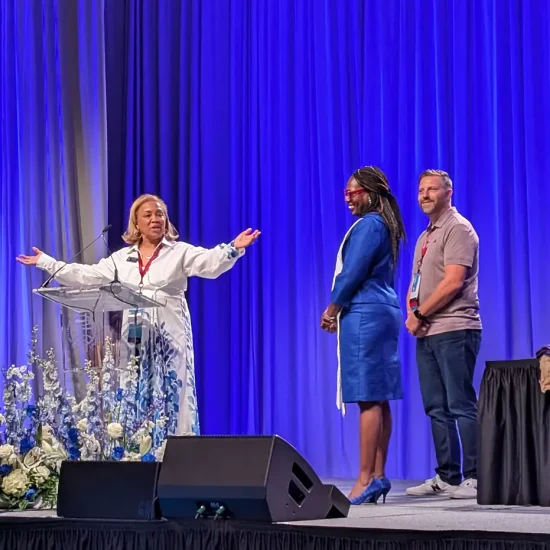

NICE CHURCHY PATRIARCHY: Reclaiming Women’s Humanity from Evangelicalism. By Liz Cooledge Jenkins. Hannacroix, NY: Apocryphile Press, 2023. 360 pages.
Many people have journeyed out from evangelicalism. The reasons vary. For some, life in evangelicalism was traumatic. For others, it wasn’t necessarily traumatic, as much as it was oppressive. Maybe not so much oppressive as confining. Not all forms of evangelicalism are the same, but over time what seemed inspiring and helpful becomes less so. Unfortunately, there are some who not only leave evangelicalism but Christianity as a whole. One of the major concerns of those who exit evangelicalism is the prevalence of patriarchy. That is, the ideology of male supremacy. Again, not all evangelicals embrace patriarchy, but it continues to be a prominent ideology — see the Southern Baptist Convention for example. It’s not only white evangelicalism; it is everywhere.

Robert D. Cornwall
As a straight white male, my journey out of evangelicalism had less to do with patriarchy than intellectual concerns, but I do know that for many women it is a major cause of deconstruction. Among those who experienced the confining nature of patriarchy within evangelicalism is Liz Cooledge Jenkins, author of Nice Church Patriarchy: Reclaiming Women’s Humanity from Evangelicalism. Jenkins addresses the problem of patriarchy and its attendant misogynism in a book that is part memoir and part manifesto. The phrase “nice church patriarchy” is a reminder that some forms of patriarchy can be soft and seemingly nice. Yet, it can still be confining. Thus, the story told here is quite different from one such as Sarah Stankorb’s Disobedient Women: How a Small Group of Faithful Women Exposed Abuse, Brought Down Powerful Pastors, and Ignited an Evangelical Reckoning, which tells rather horrific stories of oppression. Nevertheless, even if Jenkins’ experiences are not horrific in the same way as Stankorb’s stories, they are real and, in the end, traumatic.
Liz Jenkins grew up in a mainline Protestant church but encountered evangelicalism when she entered Stanford as a freshman college student. She dove deeply into the movement and stayed through her twenties. She embraced the spirituality that she found there and experienced a sense of community in a large evangelical church that embraced her. She bought into the system until it no longer fit, even as she took on more and more responsibilities at the church, including leading the congregation’s college ministry. The areas of concern that developed over time involved the patriarchal nature of the congregation’s structure, what the leaders called soft complementarianism (men and women have different roles, with men in primary positions of leadership) along with its views of LGBTQ persons. As we see in the book, Jenkins had a slow awakening regarding her views of LGBTQ persons. In the end, her emerging views proved to be a deal breaker when it came to a pastoral position at her congregation leading the college ministry. While she would go on to graduate with an M.Div. from an egalitarian evangelical seminary, even that context proved less than satisfying.
Cooledge dives the book into two major sections. Part I is titled “Naming Misogyny’s Faces.” This section is largely autobiographical. It is here that Jenkins unwraps her growing awareness of the confining nature of her context that includes a series of what we might call microaggressions that opened her eyes to the challenges of patriarchy, even if it was a soft form of complementarianism. As I pointed out above, what we read here is not the aggressive and debilitating form of patriarchy that Sarah Stankorb describes in Disobedient Women. This is not the overtly abusive form of patriarchy embraced by Bill Gothard and others like him. Nevertheless, for a woman discovering her gifts of ministry and leadership, it can be disempowering. In her introduction, Jenkins writes that “Some of my stories might seem like relatively small things. And they may be. But small, everyday things—the kinds of things that can so easily come to seem normal — add up to a lot” (p. 4). She adds that such things should not be considered normal. Thus, “the friendlier, gentler faces of misogyny are still faces of misogyny” (p. 4). That is largely what we have here. This could be a more common experience for women in evangelical communities, even ones that seek to be egalitarian, than the horrific kinds described elsewhere.
Part 2 of Nice Churchy Patriarchy focuses on “Dismantling Misogyny’s Power.” Jenkins begins by examining biblical texts that both limit women’s voices and those that expand them. This is an important conversation because evangelicals usually claim to be biblical people. So, what do we do with the Bible? This is followed by a section on “Expanding Theology.” One of the issues raised here concerns what sits on a person’s bookshelves. She raises a concern about the predominance of white male authors. If I look closely at my own bookshelf, I must confess they are dominated by white males (like me). She helpfully points out that most books written by women and persons of color tend to be focused on gender and ethnic concerns, rather than generic biblical and theological studies. Thus, white men continue to be the “experts” on more general theological matters. She also takes up the language of worship and the tendency toward masculine images and pronouns. She rightly suggests that there are alternatives, even in the Bible. She also addresses the history of women and people of color that too often gets erased. She begins this section with a chapter on “Brother Seymour and His Sisters,” which explores the Azusa Street Mission led by William Seymour, an egalitarian community led by an African American man and several women. She then proceeds to tell about other women whose stories are less well-known but are empowering. These include women such as Jerome’s partner in ministry Marcella and Hildegard of Bingen. As she seeks to reclaim her agency as a woman, she also shares why she eventually left a congregation that claimed to be egalitarian but ultimately failed to live up to that calling. As part of the conversation, Jenkins invites women (and their allies) to express their anger at the misogyny experienced within the church. The final section in Part 2 invites the reader to reimagine authority, including recognizing the full agency of women. In doing so she tells the story of finding a fully empowering congregation (a Presbyterian one) that fully embraces women in leadership.
While Stankorb’s book on Disobedient Women may open eyes to the truly oppressive forms of patriarchy, such as the forms embraced by the Southern Baptist Convention, Focus on the Family, and other preachers and organizations, Jenkins highlights the less oppressive but still confining dimensions of softer patriarchal communities. She also addresses the problem of the lack of LGBTQ inclusion in even more progressive and egalitarian evangelical communities, including the seminary she attended. She closes the book with an inclusive language prayer that lifts up the points of conversation from each of the chapters. She also adds a reading list of books, mostly written by women and persons of color that might prove empowering.
As I read Jenkins’s book as a white male who experienced evangelicalism and now lives in a post-evangelical world, I acknowledge that I didn’t experience the oppressiveness of evangelicalism in the same way that she did. However, I know the stories that others have told about their experiences. I remember experiencing the same seminary that Jenkins attended, only I did so back in the 1980s. While this seminary that formed me in many ways had already embraced egalitarianism, the faculty was still mostly composed of white men. These were important influences on my life, but I had limited opportunities to study with women. That began to change in the late 80s and into the 90s as new professors were hired. I also remember that on the day of my M.Div. graduation, the women graduates held a separate communion service as a protest to the lack of progress toward true egalitarianism. Things are somewhat different there today, but still not where they should or could be.
As I read Jenkins’s Nice Church Patriarchy, I wondered why she chose to create alternative names for the churches and the seminary she experienced. Perhaps she did so to protect the innocent or maybe keep the focus more generalized rather than focused on the church and seminary. I understand to some extent why she did this, but with a bit of sleuthing, I discovered the identity of these entities. I acknowledge that revealing the identity of the congregation likely wasn’t necessary, but I wish, for personal reasons, that she had named the seminary.
So, why should you read Nice Churchy Patriarchy? I hope I have given enough introduction to Liz Jenkins’ book that you will discern its value. I believe that this book can be helpful to women and men who seek a more egalitarian and inclusive faith experience. This is especially true for women who find themselves experiencing communities that are “soft” in their complementarianism. But even in non-evangelical communities, microaggressions still occur. Perhaps that is the main message here. Microaggressions might not be as traumatic, but they can be debilitating, preventing people from fully embracing and developing their spiritual gifts, especially gifts for ministry. For evangelical women who are wondering if there is a future for them within the larger Christian community, Jenkins lets them know that they’re not alone and that there are communities that are welcoming and empowering. Therefore, women (and men) who are considering abandoning evangelicalism need not abandon Christianity to find freedom.
You can learn more about this book by listening to an interview with Liz Cooledge Jenkins on our Dangerous Dogma podcast:
This review originally appeared on BobCornwall.com.
Robert D. Cornwall is an ordained minister in the Christian Church (Disciples of Christ). Now retired from his ministry at Central Woodward Christian Church (Disciples of Christ) of Troy, Michigan, he serves as Minister-at-Large in Troy. He holds a Ph.D. in Historical Theology from Fuller Theological Seminary and is the author of numerous books including his latest “Second Thoughts about the Second Coming: Understanding the End Times, Our Future, and Christian Hope” coauthored with Ronald J. Allen. His blog Ponderings on a Faith Journey can be found at www.bobcornwall.com.






